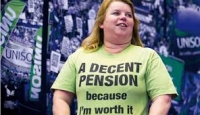Make Pensioners Pay National Insurance to Help Fund Social Care, Says Sir Andrew Dilnot
Monday 19 July, 2021 Written by Simon COLLYER/Harry Yorke, Whitehall Editor
ADULT SOCIAL CARE - We were invited to take part in a BBC Essex feature about Adult Social Care but arrived back too late to take part in a recording for a show going out at 09:00 tomorrow (20/07/2021).
Our concern is this is being rushed out with no consultation with those who have paid into the National Insurance Fund over the course of their lifetime. Whose money is it exactly, not Boris Johnsons for sure, and while we appreciate the governments need for a solution...we would argue is not their money to spend...it's ours?
Savers who pay into the fund should have a say about how their money is spent. Whilst some people may be just unlucky if they suffer ill health, should those people who have looked after themselves be forced to support those who are obese, who have smoked and used drink and drugs to excess without a care about their future health?
Some of course are just plain unlucky when the best genes were handed out to others, but some might argue why should savers have their pensions reduced to fund those who have essentially abused themselves and now need considerable help. If you applied to get private health cover and you were in terrible shape, either you would get turned down or you would have to pay higher premiums.
It seems this matter is being rushed through. Most savers have heard nothing about it. Whose money is it - the government or savers who have had this cash deducted from their wages over the decades. Once the government finds it can raid state pensions, how soon is it that more will be taken. 20% VAT was we recall only meant to be a temporary measure. We sympathise with the issue, but we are concerned this seems to be a rush job. Sir Andrew Dilnot may talk as if £10 billion is a triffling amount (we thought it was £11 billion) but other might take a different view.

Image: Sir Andrew Dilnot.
The UK state pension is the worst in the developed world, according to data from Organisation for Economic Co-operation and Development.
As a percentage of average earnings, the UK government pays out 29 per cent, putting it at the bottom of a table which is led by the Netherlands, which pays 100.6 per cent, Portugal, which offers 94 per cent, and Italy, which gives 93.2 per cent.
The UK is joined at the bottom of the list by Japan, Poland and Mexico, but all these countries still pay better state pensions, the report by the group of developed nations showed.
Mexico's is the closest, representing 29.6 per cent of average earnings but the next country in the ranking, Poland, pays 38.6 per cent while Japan pays 40 per cent.
Germany is around the middle of the pack, paying 50.5 per cent of average earnings, just above the USA which offers 49.1 per cent.
The average across the OECD is 62.9 per cent.
| Rank |
Country |
% of average earnings |
| 1 |
Netherlands |
100.6 |
| 2 |
Portugal |
94.9 |
| 3 |
Italy |
93.2 |
| 4 |
Austria |
91.8 |
| 5 |
Spain |
81.8 |
| 24 |
UK |
29 |
|
OECD average |
62.9 |
Baroness Ros Altmann, a former pensions minister, said the figures showed the UK's state pension was not sustainable.
She said: "With our aging population, and a decline in traditional final salary-type pension schemes, the UK faces rising risks of old-age poverty.
"To avoid burdening younger generations with significant tax rises, it is vital that more is done to boost private pension saving.
"Auto-enrolment is a good start but the pensions industry needs to attract more customers to pay more into their pensions."
UK pensions are some of the lowest in the developed world. Something needs to be done. We need more time to let stakeholders, those who have paid in diligently over the years to have a say in what is done with their money.
Article below by: Harry Yorke, Whitehall Editor
Pensioners should be made to pay national insurance contributions to help fund social care reforms, the author of Boris Johnson’s favoured plans has claimed.
Sir Andrew Dilnot said it was “entirely reasonable” for people over retirement age to pay the contributions in order to help meet the estimated £10 billion a year cost of overhauling Britain’s social care system.
People currently stop paying national insurance once they reach the state pension age.
However, Sir Andrew, whose decade-old recommendations are believed to form the blueprint of Mr Johnson’s plans, suggested that imposing national insurance contributions would be the fairest way to fund the reforms.
Pointing out that the average income and wealth of older people had “grown massively” over the past 50 years, he added: “It’s very important that charge should be paid by older people as well as younger people.”
It comes amid reports that the Prime Minister is now backing proposals for a new tax to pay for reforms to Britain’s social care system, with Downing Street said to be “comfortable” about the idea.
Sajid Javid, the Health Secretary, has also signalled his support for a social care levy or hypothecated tax, telling The Telegraph last weekend that it may be the “obvious solution” to a problem that has plagued successive governments.
The suggestion that Mr Johnson and Mr Javid are now aligned on the way to fund a new system has been seen as a major milestone by some in Whitehall, who said the biggest stumbling block until now had been an securing agreement on how to fund the plans.
However, it is unclear whether Rishi Sunak, the Chancellor, is also in favour. Mr Sunak has been pushing Mr Johnson to agree to a funding mechanism alongside the policy.
Mr Johnson is said to be pushing for a cap on individual lifetime care costs, which could be £50,000, with the state stepping in to pay the rest.
Number 10 is said to be pushing for a deal to be struck in time to announce the policy before next weekend, which marks the second anniversary of Mr Johnson’s elevation to Prime Minister, when he pledged to “fix the crisis in social care once and for all”.
And more on Pensions
This is what happened to pensions under prime minister Margaret Thatcher
The governments of Prime Minister Margaret Thatcher made several major changes to the UK pensions system during the 1980s. Professional Pensions takes a look at some of the milestones.
Paradoxically, while Baroness Thatcher's governments strived to roll back the state and reduce the burden of tax and regulation in many areas - pensions largely saw the opposite, with a huge increase in regulation and taxation.
Personal pensions and compulsory scheme membership
The 1986 Financial Services Act introduced personal pensions, made changes to contracting out and stopped employers forcing employees to join an occupational pension scheme.
Personal pension plans which allowed both individuals and employers to contribute - became available on 1 July 1988. They replaced retirement annuity plans, which allowed an individual to build up a lump sum for retirement, part of which had to be used to buy an annuity and part of which could be taken as a tax-free lump sum.
This change coincided with the removal of the ability of employers to force employees to join an occupational pension scheme - something the then Department of Social Security flagged up in a series of adverts, showing how individuals could ‘break the chains' of compulsory scheme membership.
While personal pensions gave individuals more flexibility, it also led to the mis-selling scandal of the early 1990s, where some members decided not to join or to leave an occupational scheme with employer contributions in favour of a personal pension plan with only minimal contributions.
The scandal is estimated to have cost insurers and financial advisers at least £11.8bn in compensation payments.
Buck Consultants head of pensions policy Kevin LeGrand says personal pensions were the "perfect example of the individual responsibility and freedom that marked the Thatcher years".
He adds: "While there is a lot to say for that in some instances, the way it was applied in pensions was I think, with hindsight, not the right way to go. No-one at the time seemed to realise the average man in the street wasn't equipped to deal with the freedom in relation to something like a pension scheme."
However Barnett Waddingham consultant Malcolm McLean said he did not think it was right to attribute all the blame for the personal pensions mis-selling scandal on the government.
"Although there were a few mistakes in the government's promotional activities there was nothing inherently wrong with the concept and the industry must accept responsibility for what happened thereafter." he says.
"Indeed the level of compensation that had to be awarded was ample proof of the scale of the abuse and the naked greed that accompanied it."
Independent pensions adviser Ros Altmann adds: "The principle was right, but the practice turned out to be problematic. Fees were too high, investment promises were too optimistic, reliance on annuities and inflexibility of products have all damaged DC pensions in practice. If expectations had been managed well and fees and charges had been more reasonable, without the lure of commission-induced hard-selling and transfers out, the retirement savings culture would not have been so badly damaged."
Taxation of scheme surpluses
The Finance Act 1986 also saw the introduction of rules to reduce pension scheme surpluses.
The legislation forced schemes with funding levels in excess of a certain amount to reduce surpluses by making (taxable) payments back to the employer; suspending employer or employee contributions; improving benefits; or providing new benefits to members.
Prior to this legislation there was no specific provision for repayment of monies from a pension fund back to an employer. Individual schemes had to go back to the Superannuation Funds Office, the part of the Inland Revenue dedicated to dealing with occupational schemes, to get any refund individually approved.
Buck Consultants' LeGrand explains: "It gradually started that, on an individual basis, you could go to the SFO and make the case and, if you successfully made the case, they would allow you to pay back some money to the employer"
Yet, because there was no provision to tax these repayments, LeGrand says some firms began to realise this was a good deal for the employer - as the money was tax free going in and not taxed coming out.
When companies started to explicitly state they would take money out of the scheme to boost profits - the politicians decided to act.
The new rules led to a number of schemes refunding money to employers and many employers taking contribution holidays for a number of years.
Altmann explains: "The taxation of pension fund surpluses was a huge, but unrecognised, negative influence on our defined benefit pension system.
"The so-called 'surpluses' were not really 'surpluses' but were funds needed for future pensions and risk buffers against unexpectedly bad markets or rising longevity. While the schemes were immature, they should have been keeping those surpluses intact but, once they became taxable, there was an instant incentive for employers to ensure they were no longer there. If only we had had better funding buffers and risk margins, our pension system would be much stronger today."
Disclosure regulations
Pension scheme disclosure regulations started to be introduced in 1986. This was the first time schemes were required to disclose certain information to members and trade unions - even if there was no sanction, and no regulator, to enforce the rules.
These regulations included requirements to complete an annual report and audited accounts and making them available to the member.
They also included rules forcing schemes to conduct a triennial actuarial valuation. Previously it had been common practice to have a valuation every five years.
LeGrand says: "Good schemes already did this sort of thing but not necessarily in this way and this is probably one of the earliest examples of statute prescribing how a pension scheme should do things."
Revaluation for Early Leavers
In order to prevent the value of deferred members' benefits diminishing over time through the effect of inflation, revaluation was introduced to preserved benefits through a number of pieces of legislation during the 1980s.
The Social Security Act 1985 introduced revaluation to preserved benefits in excess of Guaranteed Minimum Pension (GMP) earned after 1 January 1985 - rules which came into force for leavers on or after 1 January 1986.
Preserved benefits were granted to members by the Social Security Act 1973 if they were over the age of 26 and had completed at least five years' qualifying service. However, the Social Security Act 1986 reduced the qualifying service from five to two years.
There was further change in the Social Security Act 1990, which extended revaluation to cover the whole of the member's pension, in excess of the GMP. The annual increase applicable was the increase in the Retail Price Index (RPI), capped at 5% - sometimes known as ‘5% Limited Price Indexation - LPI'.
Further changes were introduced in the Pensions Act 2008 and the Pensions Act 2011, which allowed schemes to reduce the revaluation percentage and replaced RPI with the Consumer Prices Index (CPI) as the basis for the minimum statutory revaluation.
Commenting on www.professionalpensions.com, Aon Hewitt partner Jonathan Teasdale explains: "This gave protection to scheme members against inflation - understandable given the background of large surpluses and the history of high inflation in the 1970s and 80s.
"But in hindsight it was part of the long-term trend towards legislative ‘gold-plating' that made DB pensions appear more expensive than employers felt they could afford."
Earnings Cap
The 1989 UK Finance Act implemented an earnings cap that meant employers could in future only provide pensions for employees through a tax-approved company retirement scheme on the first £60,000 of their earnings.
It applied to people who joined an occupational pension scheme set up since 14 March 1989 - or who joined an occupational pension scheme from 1st June 1989, if the scheme was set up before 14 March 1989.
The limit was originally set at £60,000 for the 1989/90 tax year, a limit that was set to increase in line with prices on an annual basis thereafter.
The same limit applied to all personal pension schemes for the tax years from 1989/1990 onwards and was referred to as 'net relevant earnings'.
The Finance Act 2004 removed the compulsory Earnings Cap as part of the simplification reforms - replacing the cap with a lifetime allowance of £1.5m and an annual allowance of £215,000 from A-Day on 6 April, 2006.
Unapproved retirement schemes
As part of the same 1989 UK Finance Act, unapproved retirement schemes were also brought into being.
The new type of pension arrangement could provide unlimited retirement benefits - including additional retirement benefits for those caught by the new Earnings Cap.
The tax regime for these unapproved schemes was less generous, but there were still some tax advantages to be had.
The introduction of these schemes was significant because, until then, the granting to an employee of any retirement benefits that were not approved meant that his/her tax-approved benefits were prejudiced.
1980 Social Security Act
The 1980 Social Security Act saw the link between state pension increases and average earnings broken in a bid to cut spending.
Had the earnings link not been abolished, it is estimated the basic state pension would have been significantly higher today.
However, as was revealed by papers released by the National Archives in 2010 and reported on by The Guardian (see: http://tinyurl.com/cvbfo99), the then Chancellor, Geoffrey Howe, had originally planned to go much further and wanted to cut the state pension by 3%.
However, faced with strong internal opposition, Thatcher abandoned Howe's plan with the government eventually settling on the abolition of the earnings link instead.
The link was only restored by the current coalition government through its "triple lock" arrangement in April 2011. The basic pension will now rise in line with average earnings, prices or 2.5%; whichever is the greater.
McLean believes this was one of the biggest pension mistakes made by the Thatcher governments. He says: "Had the link not been broken the state pension would have kept ahead of the pension credit threshold and encouraged private saving without the risk of overlaps with means tested benefits.
"If that had happened, we might not have needed the single-tier pension and the current pensioner population would have been a lot happier with their lot. It is even possible auto-enrolment would not have happened or would have proceeded in a different direction."
Conclusions
In a straw poll of 86 people on www.professionalpensions.com, just 26% of respondents believed the pensions legacy of Baroness Thatcher's governments was positive. Nearly seven-tenths (69%) said the legacy was a negative one and 5% were unsure.
McLean has mixed feelings. He says: "Bearing in mind what a visionary Thatcher was in some ways it is disappointing looking back that she failed to see what effect over-prescriptive regulation could have on an employer's ability/willingness to continue to provide final salary schemes or indeed how much at risk members of those schemes would be in the event of the firm going into liquidation."
ABC Note: Tune into BBC Essex 20/07/2021 at 09:15 to hear more.

ABC Comment, have your say below:

Leave a comment
Make sure you enter all the required information, indicated by an asterisk (*). HTML code is not allowed.
Join
FREE
Here










